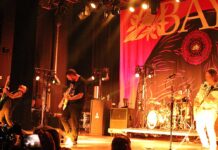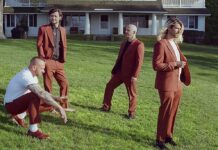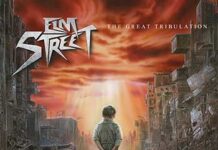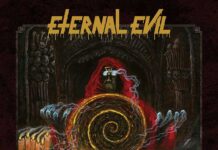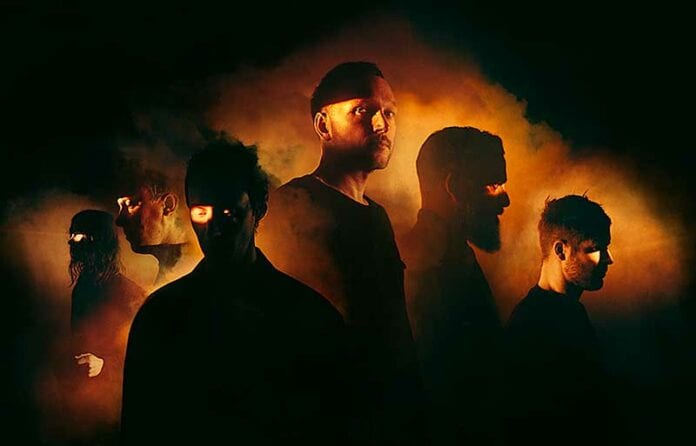
INTERVIEW WITH JOHANNES PERSSON
BY KEVIN STEWART-PANKO
PHOTOGRAPHS BY SILVIA GRAV
Umeå, Sweden’s Cult of Luna is one of the few bands that has been able to emerge from the post-metal morass with an identity intact. Having roots that go back to 1998 have been helpful in the band being one of the scant few to be mentioned as overarching influences and genre leaders not followers (the others being Neurosis and Isis), as has creating awesome music with individuated and defining characteristics.
The band has never shied away from challenges. Previous albums have seen them collaborate on Mariner with ex-Made Out of Babies and Battle of Mice screecher Julie Christmas. Their two drummers/three guitarists/immaculately lit/music store worth of gear live show pulls no punches. And they often tackle themes exploring the darker corners of the human experience.
These days, a new wind is pumping through Cult of Luna’s sail—the band’s eighth album, A Dawn to Fear is seeing the light of day via Metal Blade, chief songwriter Johannes Persson took a different tack in the writing the record, and the album was the first time in a decade they fully convened in a studio to record. Persson had just returned from a weekend of Cult of Luna appearances at Finnish festivals and was attending to his young son, who took a header into the badminton net in the family’s yard, when we reached him via Skype for the lowdown on the writing and recording of the new album and the connection between his band, trad-metal warriors Lizzy Borden, punk legends Refused, and indie pop behemoths Phoenix.
The last time I saw Cult of Luna live, you only had one drummer, but I’ve seen the band listed as still having two drummers. Are you still doing the two drummer thing, and do you do it on record?
Yeah, we do. We always do, but the second drummer does a lot of percussion, and everything we do on record, we emulate live. That’s why we need two drummers. There are a lot of things going on. Also, we try and add stuff while we play live just to make good live versions of the songs, because songs always work differently than when recorded. It’s just about maximizing the experience for us and for whoever is listening.
“IT’S AN ALBUM WRITTEN SPONTANEOUSLY AND THROUGH INSTINCT AND PRIMAL EMOTION.”
2013’s Vertikal was inspired by the film Metropolis, and 2016’s Mariner had space as its focus. What’s the theme on A Dawn to Fear?
For as long as we’ve been doing this band, we’ve worked with themes that are more or less well defined when we start off writing the albums. We’ve been doing that up until the album with Julie. It’s been a very conscious road that we’ve taken, and we’ve known exactly where we’ve wanted to go with every record before we started writing. For this one, I’m slowly seeing patterns in my attitude towards my surroundings and my place in life, and they’ve gradually changed. I thought this was very interesting. There have been small, small changes, which, in themselves, haven’t been a big deal, but when you collect them and calculate some of them, it makes a huge difference. So, I decided that when it comes to my writing, I would write everything from instinct, that I wouldn’t start with a theme or anything, that I would just write, get it out of me without thinking too much about it, and then take a step back and figure out what it means once it’s all done. Now, when I listen to it, I see so much of myself and it all makes sense. It’s like if you view a jigsaw puzzle up close, it’s just a bunch of pieces, but it you move back you see the whole picture and what has been going on. The short answer is that it’s an album written spontaneously and through instinct and primal emotion.
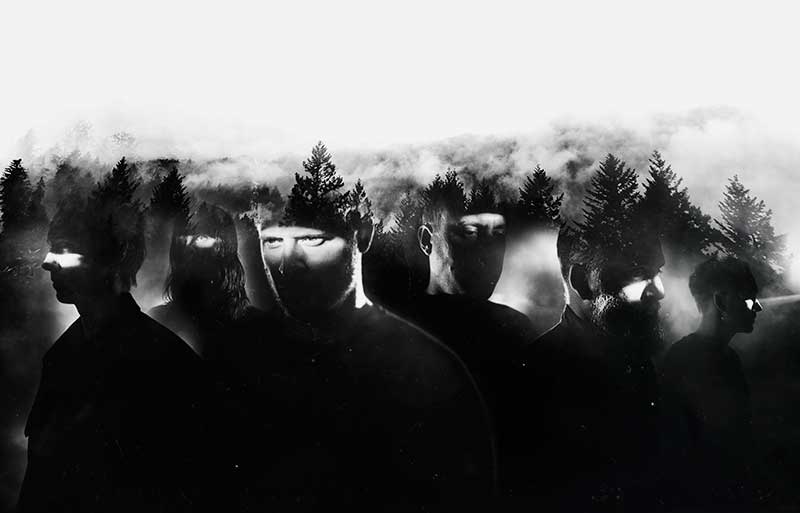
Have those changes been in your creative life or your personal life?
It was a change I noticed in my personal life that I wanted to bring to my creative life. I wanted to see what happens if, instead of trying to figure out everything, I just let my subconscious go and let that write the album and see what happens so I can surprise myself.
“I’M STILL VERY SCREWED UP INSIDE FOR SOME REASON I’M NOT SURE OF. THE WEIRD THING IS THAT I’M A PRETTY HAPPY GUY.”
Is that philosophy or idea reflected in the title? Like, something is coming over the horizon with changes you can’t see—they could be great, but it could also be something to fear?
No, no, no. The title came after. We had the record done, and I kind of walked through the theme of the songs and what came out of me. It was very obvious to me what a lot of the lyrics were all about, and I thought it was a title that captures everything, and the song that is the title track encapsulates everything and I know what it’s all about. One thing I learned from this whole experience is that I’m still very screwed up inside for some reason I’m not sure of. The weird thing is that I’m a pretty happy guy. It’s all about sides of myself that get pushed down. I open the lid and all of a sudden things spew out like a volcano.
Is that a reference to your creativity, or are you a person with a temper and explosive personality?
Yes, yes I am. Not so much now compared to how I used to be, but that’s one of my bad traits. Again, that doesn’t happen a lot now. I’ve learned to walk away, and I don’t know if this is a sign of maturity or me just figuring out stuff, but I don’t have to leave an argument or conflict with the last word. I can let things go. But sometimes, when I get pissed, I get pissed and I have no problem telling people acting like assholes that they’re assholes (laughs). Seriously! Here’s an example: in Sweden, you don’t say anything to anyone, even if your life depended on it. We are scared of conflict and everybody trash talks everybody else behind everybody else’s back, but nobody dares to confront people. I’m living in a small community and we have a Facebook group where people say shit all the time about other people, but never say anything to anyone’s face at the time, only after they go home and write about it from the secure space behind their keyboards. Anyway, the other day I was on the bus and there were these two kids, probably around 14-years-old. They were playing music on their phone without headphones—this shitty Swedish hip-hop, the worst stuff you could ever imagine. I was thinking, “These are kids, like I was, and I’m not going to give them a hard time if they’re not being too much trouble.” But their music wasn’t anything I could handle. So, I asked, “Can you turn that shit off?” And in the end they were super-scared and turned it off. Some other guy said to me afterwards, “That was great. It was really disturbing me too.” Great, but why did you wait for me to say anything? Why didn’t you say anything? That’s Sweden in a nutshell (laughs).
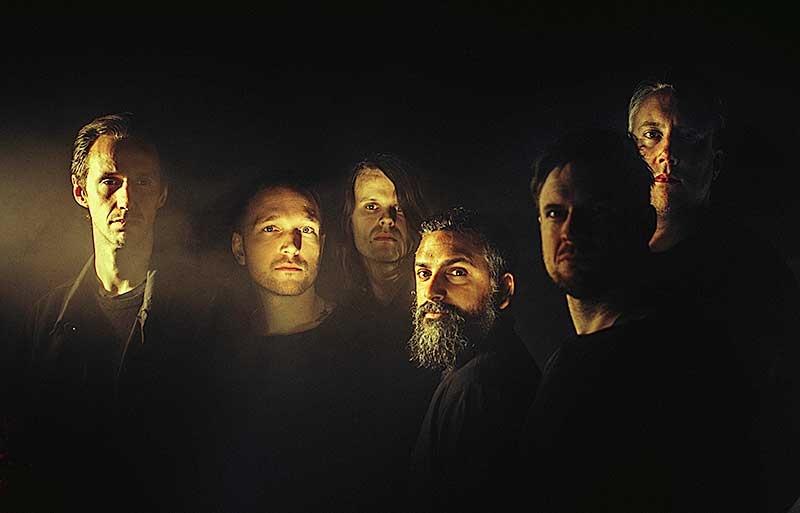
Were there any difficult adjustments you had to make in writing differently than in the past?
I don’t know, but I don’t think so because the process is what it is. It’s the same thing, just sitting down writing stuff. But I would say the quality control was a bit different because the quality control settings when we write to a theme means we always have to have the theme in mind. This time we could be way more open-minded. It’s nothing different. It’s a guitar and it’s me in the middle of the night, usually. That’s been the case for quite a while, but instead of having things set onto the theme, it’s more spontaneous. Maybe it’s a bit freer, but that’s not always good because I sometimes like to be limited. Limiting yourself forces you to take positions you wouldn’t take otherwise, which sometimes makes it harder. But there was a lot of music coming out for a long time, so I wouldn’t say it was that different. The one thing we did do different was that for a couple records we’ve dragged out the whole recording process, since we live in different cities and we’ve recorded in different studios and all that. This time we decided to go to a studio and live there for two weeks and have some kind of a music factory where we recorded and hung out. That was a big difference from the last decade. The last album we did that was probably [2006’s] Somewhere Along the Highway. It created a more collective feel where if you’re questioning your own musicianship or part of a song, people are around and you can discuss things and come up with ideas right there. That was very rewarding.
Was there an adjustment made in returning to that method of recording?
No, we know each other very well and there was nothing to adjust to. It was more like being on tour. We have a lot fun just hanging out. It was like being on tour except that we were staying at the same beautiful studio in the northeast part of Norway by the sea. It was like, “Next stop, Greenland!” The place is called Ocean Sound Recording—a great studio.
“NOW, WE TRY TO PUSH THE BOUNDARIES OF WHAT WE’RE ABLE TO DO AS MUSICIANS.”
Was there anything that you applied from the live experiences, touring of the last album, and playing live with Julie to the new record?
It’s been a gradual process for the last couple of records. We started off trying to maximize everything we do in the studio, which was very hard to do, trying to reproduce everything live. Now, we try to push the boundaries of what we’re able to do as musicians. The last couple of tours we’d done were with Julie, and that was for a record that was never supposed to be played live, which gave us a bit of trouble when we had to figure out how to do it. In some ways, we were put in strange situations, especially with our keyboard player who only has two hands, for example. How do you solve that? But we have a lot of talented people in this band who know how to solve problems. This record is so organic, but it’s also a question for the future because we haven’t played those songs yet.
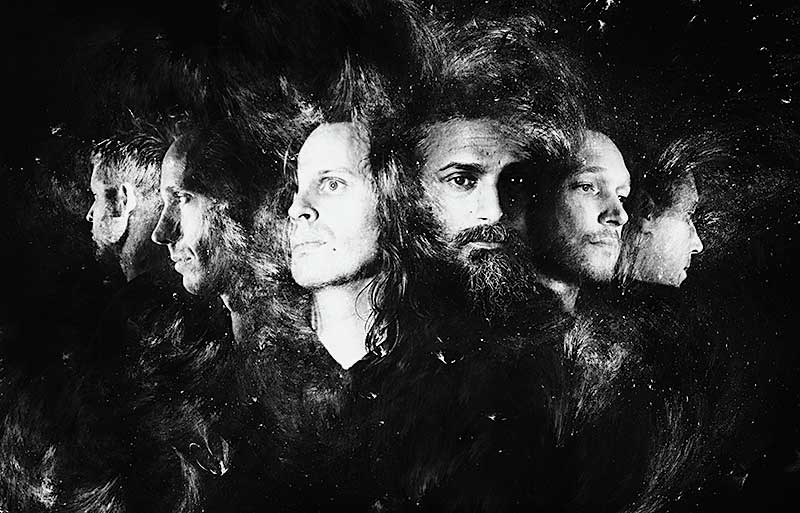
How did you end up signed to Metal Blade?
Don’t ask me (laughs). The one good thing about working with managers and all that is that I don’t have to deal with anything but writing music and playing live. That’s the only things I’m interested in when it comes to the music business. However, I don’t know the story of how we ended up there. I guess they made the best offer. That’s a very un-sexy and un-romantic answer, but that’s probably how it happened. With that said, Metal Blade is one of the most iconic labels, and when I picked up Lizzy Borden’s Menace to Society in 1987 and saw that logo and read Metal Blade, which were probably the coolest two words ever put together for a seven or eight-year-old kid, I never thought I’d see that on one of our records. They have a great legacy with so many bands that I’ve been listening to religiously for years, and the little contact I’ve had with the people from the label has been very promising and I’m looking forward to seeing what they can do and I hope not to disappoint them.
How far removed are you from the business side of things?
As far as possible (laughs).
“WE DON’T DO ANYTHING BECAUSE WE HAVE TO, WE DO IT BECAUSE WE WANT TO.”
Don’t you worry about being ripped off, not being consulted properly on something, money disappearing?
I just don’t care. Okay, it’s not like I don’t care, but one of the strengths of this band is that we work with friends. Our manager is not only our manager, he’s a friend who became our manager. I have 150 percent trust in him, as I do with all the people in the band. The one good thing about this band is that it’s never been the main income of anyone. We’re not financially dependent on this band at all. Because of that, it’s made us way freer to do what we want. There’s nothing like “we have to release a record, we have to tour, we have to do this and we have to do that.” We don’t do anything because we have to, we do it because we want to. All I need is to be able to write and record music and have somebody tell me what time to be on stage. We still have quality control when it comes to the artistic part. We don’t let anything get past us without our stamp of approval. But when it comes to the financial part or when people ask me about merch or whatever, don’t ask me. I have no idea! I probably know less than you do. I just play in the band.
In that case, what are your day jobs?
I’m my own boss. My main income is working as a casting director for films and TV series. Sometimes I write and direct, but that’s my main business. I have employees. I have the privilege to decide when I’m home and when I’m not. The only thing that limits me is my family. Thomas [Hedlund], our drummer, works as a full-time musician. He plays in Phoenix, which is one of the biggest indie bands in the world. Our second live drummer [Christian Augustin] is also a musician. The other guys have normal-ish jobs. [Keyboardist] Kristian [Karlsson] works as a sound engineer, [guitarist/vocalist] Fredrik [Kihlberg] is a social worker, [bassist] Andreas [Johansson] is a plumber, but we manage to work it. It’s kind of strange, but it’s worked this far.
Now that you’re signed to Metal Blade, what do you think is going to be different about life in Cult of Luna?
I think we’re going to do more touring. We’ve been on the down low when it comes to touring for quite a while now. The only tour we’ve done as Cult of Luna was in 2013 or 2014. We did those two tours with Julie, so it’s not like we haven’t played, but I’m talking just a proper Cult of Luna tour. Naturally, it’s going to increase a lot, but we’re way past the time where we’d do six weeks through Europe in the winter. That’s never going to happen again, but I know we pretty much have our live schedule set until next fall.
I noticed you were promoting the documentary film UxÅ: A Journey to the Heart of the Umeå Hardcore Scene.
I was in that movie saying some dumb things like I always do. I remember the dude from Desperate Fight Records called to say they were doing this documentary project and he asked if I could do it. I had just got home from a tour, and they were there ready to shoot the same night I came home with [guitarist] David [Sandström] from Refused. So, I was really tired and did a shitty interview and it ended up in the documentary talking about the hardcore scene and its legacy.
Is that scene and the early years something you can’t escape or something you acknowledge?
No, I acknowledge it because I have to thank it for everything I’ve done. I’m not saying I don’t have a complicated, double-edged relationship with the Umeå hardcore scene, but my feelings are mostly positive and it’s pretty much what taught me everything I know. I was privileged to live in that age and see how special it really was and what kind of crazy time it was. It’s crazier to think about it in retrospect. To us, it was normal that we had this huge amazing scene in a very small city. If you compare it to what’s going on now, there’s nothing like it. I haven’t seen it before or seen it since, how a subculture totally dominated the youth of a city. It was so weird. The first show I ever played when I was 14 or 15 was in front of 500 people. You cannot underestimate that. Also, playing in a band, you’d see bands from the same scene touring the US and Europe, and we just thought that’s how things worked, especially before the way the internet is today. That’s not normal in Sweden, but it became normal. We’d learn how to book all that stuff ourselves. The months I spent on the roads of Europe, playing squats in Graz or occupied farms in Valencia, that’s how I learned where music can take you and had some of the best experiences of my life. It’s also how we came to value where we are now with Cult of Luna.


